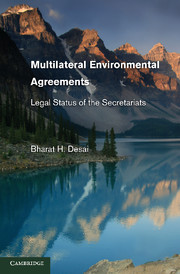Introduction
Published online by Cambridge University Press: 05 September 2013
Summary
There is an active link between development of law and the institutional mechanisms that emerge from it. In this context, the establishment of a multilateral regulatory approach in the field of environment is no exception.
The process of centralized legalization concerning sectoral environmental problems has almost been institutionalized, especially in the past three decades. Despite the fact that this multilateral lawmaking modus operandi has worked in a piecemeal, ad hoc, and sporadic manner, it has contributed in thickening the web of treaties as the most important source of international environmental law. It has emerged as a “predominant method” of regulating state behavior on a global problematique. Unlike the traditional method of resorting to development of a customary norm, states revert to treaties for the sake of, among other goals, convenience and certainty of the law, as warranted by the contingencies of a specific issue.
It appears that lawmaking on environmental issues is greatly facilitated through treaties because of scientific uncertainties and the sense of urgency involving environmental matters. As a result, multilateral environmental agreements (MEAs) have emerged as a unique technique, with flexibility, pragmatism, a built-in lawmaking mechanism, as well as a consensual approach to norm setting. MEAs are also regarded as part of a broader trend of an “increasingly more complex web of international treaties, conventions, and agreements.”
Treaty making on environmental issues has developed into a practice largely because of the inclination of states to resort to multilateralism in addressing global problems.
- Type
- Chapter
- Information
- Multilateral Environmental AgreementsLegal Status of the Secretariats, pp. 1 - 6Publisher: Cambridge University PressPrint publication year: 2010



